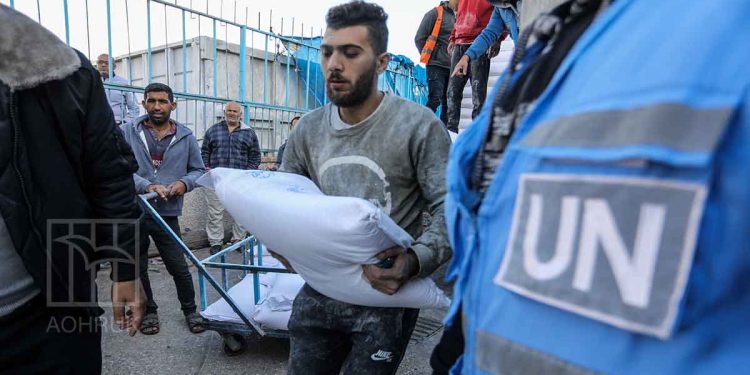The population of Gaza is starving to death due to constraints imposed on humanitarian aid, the World Health Organization’s emergencies director Michael Ryan said on Wednesday.
Ryan said in a press conference, “There are residents who are dying of hunger and are being pushed to the brink of the abyss, and they are not parties to this conflict (…) and they must be protected, and their health facilities must be protected.”
Ryan added that “This is a population that is starving to death, this is a population that is being pushed to the brink,” adding that “The civilians of Gaza are not parties to this conflict and they should be protected, as should be their health facilities.”
He pointed out that “The Palestinian people in Gaza are right in the middle of a massive catastrophe,” Ryan said, adding that things could get worse.
Ryan said that access to proper nutrition had become a major issue in the Gaza Strip, with the calorie count and the quality of nutrition consumed by people of Gaza having dropped sharply. Populations are not supposed to survive indefinitely on food aid, he said.
“It’s supposed to be emergency food aid to tide people over.
“And if you mix a lack of nutrition with overcrowding and exposure to cold through lack of shelter… you can create conditions for massive epidemics,” particularly in children.
“And we’re seeing them,” Ryan said.
In the same context, in a press briefing on Wednesday, WHO Director-General Tedros Adhanom Ghebreyesus said more than 100,000 Gaza residents are either dead, injured, missing or presumed dead in the war with Israel.
Tedros added that the risk of famine is high, with many medical staff and patients receiving only one meal per day.
Tedros pointed out that Nasser Medical Hospital in Khan Yunis currently operates with only one ambulance, while patients are brought in on carts drawn by donkeys.
The United Nations Relief and Works Agency for Palestine Refugees (UNRWA) described the living conditions in the Gaza Strip, specifically in the Gaza and northern governorates, as catastrophic due to the Israeli war, given the “lack of basic food supplies.”
Inas Hamdan, Acting Director of the UNRWA Information Office in Gaza, said in media statements, that the living conditions in the Gaza Strip as a whole, especially in the Gaza and North governorates, are very disastrous.
She added that the least that can be said is that the situation is very tragic. Basic foodstuffs such as flour and rice are not available, and the residents there already do not have enough to eat.
Hamdan explained that the food shortage in the Strip and Gaza and northern governorates exacerbates the tragic situation there and leads to more health problems given the lack of appropriate living conditions.
She indicated that the process of sending humanitarian aid to Gaza governorates has become one of the very complex tasks due to the Israeli restrictions, where it became no longer possible to deliver aids to many areas in the Gaza and northern governorate.
She pointed out that there is an urgent need to send more food and relief aid, such as blankets, especially in the cold weather conditions, in addition to sending medicine to the two governorates.
Hamdan pointed out that two convoys that UNRWA had recently sent to the northern Gaza Strip were under fire during their return to the south.
She emphasised that this is unacceptable, as the humanitarian teams working to delivering aid to the displaced must be protected, and the arrival of all humanitarian aid must be facilitated in appropriate quantities.
Earlier, the Palestinian Ministry of Health in Gaza said that the Israeli occupation forces committed a new massacre against thousands of hungry people who were waiting to receive aid near the Kuwait Roundabout intersection, south of Gaza City, killing 20 citizens and injuring 150.
This is not the first time for the IOF to target gatherings of citizens waiting to receive humanitarian and relief aid that rarely reaches Gaza Governorate and the northern Gaza Strip.
Since October 7, 2023, the IOF has been waging a devastating war on the Gaza Strip, resulting in catastrophic humanitarian and health conditions, due to the continuous bombing and the prevention of supplies of food, water, medicine, and electricity.
The Israeli aggression on the Gaza Strip constitutes a blatant violation of international humanitarian law and human rights, as it exposes the lives and property of civilians to extreme danger, which requires urgent intervention from the international community to stop the aggression and protect civilians in the Gaza Strip.
This international community must force the IOF to adhere to international laws and treaties on human rights and international humanitarian law. They must be obliged to protect the rights and lives of civilians, prohibit their targeting and preserve their safety, and punish the leaders responsible for committing war crimes in the Gaza Strip and elsewhere.






























